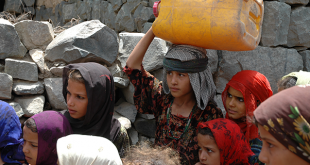
As we try to build peace in the African nation of Mali, there is one area we cannot overlook: food for children. Mali has been devastated by the war in the northern part of the country.
We know that war is always accompanied by hunger and malnutrition. In Mali, children have suffered the most.
A UN resolution this week urged peace talks between the government and Tuareg rebels. That same resolution also stated extreme concern over the “significant ongoing food and humanitarian crisis.”
The UN World Food Programme (WFP) is the lead agency helping Mali fight hunger. WFP has started an emergency program feeding children at schools in the north.
It starts with a breakfast called Super Cereal Plus, a protein-enriched porridge filled with vitamins and minerals. This “superfood” fights off malnutrition.
The feeding program does not stop at breakfast. The children get a lunch of hot porridge made with rice, vegetable oil, beans and salt.
This is a great program for children. Here is some testimony collected by WFP.
Ousamane Soumaila, a grade 6 student from Gao city, says, “I can tell you that lots of my friends and I come to school regularly thanks to the canteen. It also encourages students to come on-time because we know we’ll get breakfast when we arrive.” The principal of one school says, “Out of a total of 123 students, 122 have perfect attendance. The meals have really improved attendance and have also encouraged children to arrive on-time.”
The problem is funding, because fighting hunger is just not prioritized enough by donor governments. This always leaves gaps in feeding programs, which limits the ability of countries to bounce back from conflict, disasters or poverty, and Mali is a country that suffered through all of these.
School feeding in Mali cannot reach all of the children until funding comes through from the international community. The lack of funding is taking its toll on the school meal plan in Northern Mali. Krystle van Hoof of WFP in Mali says, “Out of our target of 220,000 children reached (to be completed by December 2014), we are reaching just 114,000 (52% of our goal).”
In Southern Mali there are over 70,000 children missing out on the school meals also because of funding difficulties. WFP relies on voluntary donations from governments and the public. The UN food agency is stretched thin by massive humanitarian emergencies in South Sudan, Central African Republic and Syria.
If funding does not come through for Mali, the children will pay a price. Rations could be reduced or more children will end up missing meals. It’s vital that feeding programs be universal in every country, for that is the only way to ensure that malnutrition does not spread. In addition, you cannot build or rebuild a country with children missing out on education. Food at school gives them a chance to learn and grow.
 Blogcritics The critical lens on today's culture & entertainment
Blogcritics The critical lens on today's culture & entertainment



